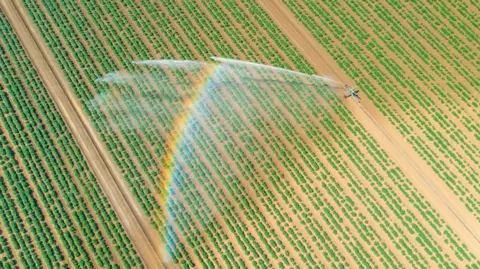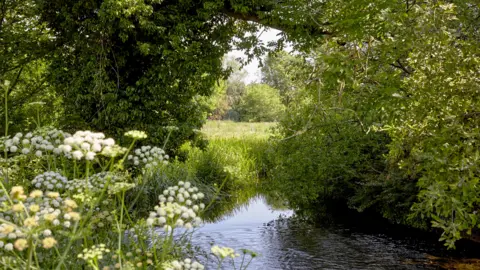More than 150 farms in England caught using local water illegally
 Getty Images
Getty ImagesMore than 150 farms in England have been caught illegally taking too much water from rivers, lakes and underground sources, a BBC analysis reveals.
Since mid-2022 there have been nearly 200 breaches of permits allowing farmers to use water from local sources, according to Environment Agency data obtained through a freedom of information request.
Of these incidents, 141 threatened environmental damage - but just one farmer has been prosecuted.
The Environment Agency said in response that it carried out 3,000 licence inspections each year, with prosecution a "last option for persistent offenders".
 Getty Images
Getty ImagesRiver campaigners said the breaches of so-called abstraction licenses were "the tip of the iceberg" and England's current enforcement system had "no deterrent effect".
The violations date from the beginning of the record-breaking hot spell of 2022, which put pressure on water supply, to this spring, which has been the UK's sixth driest spring since records began in 1836.
The National Farmers' Union (NFU) has been approached for comment by the BBC.
In England, water is abstracted by water companies for public supply, by industry and for use in electricity generation, such as power station cooling.
But agriculture often needs large volumes from local sources for irrigation, particularly for water-intensive crops like potatoes in prolonged dry spells.
Over-abstraction of water, particularly during a drought, can severely impact river levels and adversely affect fish and other wildlife and their habitats as well as intensify pollution levels.
Under the Water Resources Act 1991, the licensing system is in place to control how much water is taken and a licence is needed by anyone taking more than 20,000 litres a day.
'No deterrent effect'
The Environment Agency inspects and monitors farms for any licence breach, which can be a prosecutable offence.
Using a request under the Environmental Information Regulations (EIR), BBC News found that, of the 199 breaches committed by 154 farms between 2022 and June this year, 141 incidents were category one, two or three breaches, all classed as having a foreseeable impact on "human health, quality of life or the environment".
But only one farmer was prosecuted and one was given a fine as a civil sanction while 137 were simply given warnings or advice and no action was taken against three.
There are currently 12 ongoing investigations.
Ten farms breached their licences during the first five months of this year.
A further four farms were found to be abstracting water without the necessary licence at all.
The figures come after a report last week by green watchdog The Office for Environmental Protection (OEP) found that some licence-holders would only be inspected once in 20 years and, in 2023/24, 84% of licences were not being inspected.
Dr Justin Neal, from the river campaign group Wildfish, said the number of farm over-abstractors uncovered was "the tip of the iceberg".
"With a minimal risk of being caught and few prosecutions, there is absolutely no deterrent effect.
"That means taking too much water is now an acceptable occupational risk," he explained.
He added that the exemption that allows farmers to take up to 20,000 litres a day without a licence meant no-one could be sure how much water was being abstracted by farms across England.
Wildfish is now calling for more inspections and a new enforcement strategy with less focus on advice and greater use of "suitable sanctions" for those who break the law.
'Proportionate approach'
The Environment Agency said it would be improving inspections using technology such as satellite monitoring to detect how much water is being put on fields and crops, and making better use of intelligence to identify the highest risk abstraction.
A spokeswoman for the Agency said that it took its role as a regulator of how the country's water resources are used "extremely seriously".
"If sites are found to breach their abstraction licence, we take an advice-led and proportionate approach with prosecution as a last option for persistent offenders," she added.
Last month, the Department for Environment, Food & Rural Affairs (Defra) announced the number of farm inspections would increase to 6,000 a year by 2029.
In June, the Environment Agency also published its five-year National Framework for Water Resources, which sets how water companies, farms, businesses and the public should best manage water usage into the future.
It set out plans to make all water abstraction environmentally sustainable, with particularly sensitive areas, such as chalk streams, given greater protection.
It recognised the impact of water shortages on food production but said it would work with farmers to identify how they can become more resilient by sharing water resources and building jointly-owned reservoirs.

Sign up for our Future Earth newsletter to keep up with the latest climate and environment stories with the BBC's Justin Rowlatt. Outside the UK? Sign up to our international newsletter here.
